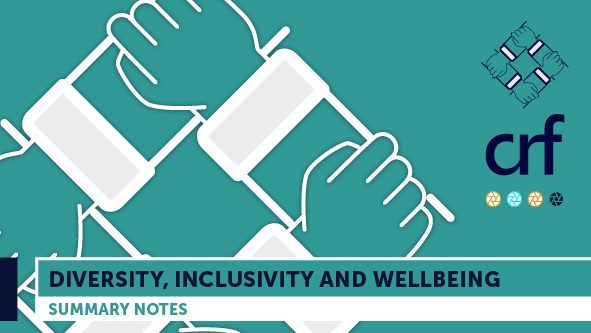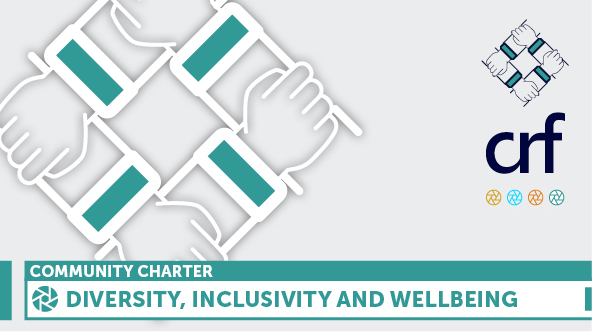RECENT MEMBER QUERIES
From American headquartered manufacturing business.
CRF’s Response: We made connections with four other members that have developed a truly global policy, from a range of industry sectors:
– A global media and marketing firm
– A multinational telecommunications and information technology company
– A multinational financial services firm
– A UK-based multinational asset management company
From a multinational telecommunications & information technology company.
CRF’s response: We posed these questions to a number of members and received the below responses:
“We do not operate with quotas nor a corporate programme specific for Diversity and Inclusion. There is interesting research that identifies a culture of inclusion as foundational to achieving employee engagement. With a global engagement score of 93%, validated earlier this year, our leadership seems to have been able to deliver on inclusion through focusing on being purpose-driven, and values guided, in our day to day work lives.”
“No, we don’t… it may be something for the future but we’re quite a long way off that now.”
“We are signed up to Women in Finance which states specific targets. Progress against these as targets are considered at year-end.”
“We are still debating measures and working through what would be truly global and engaging. We do link D&I into our balance scorecard and we are on a journey to formalise the reward for achievements of this.”
“In our annual engagement survey this September we are introducing an Inclusion Index. Each manager will get a score from their team, and we will provide guidance for managers on how to discuss their score with their team and improve it. However, this score doesn’t directly impact on reward.”
“Our targets or ambitions are company-wide not individual. We are pretty new to D&I and culture-wise we felt it was important in the first instance that our colleagues understood D&I, its benefits and how we are measuring it. We didn’t want it to carry any negative associations. Outside of the usual demographic statistics, we do look at indicators such as grievances raised and bullying/harassment cases, to spot any patterns. The only real link to reward is that the personal element of our bonus scheme is linked to personal performance. A happy/diverse team is usually reflected in attainment of goals/targets, whereas high turnover or employee relations cases tend to result in underperformance. The other thing I’ve considered at a senior level is rewarding inclusive behaviours such as ‘export or sharing of talent’ or number of internal promotions or transfers. I feel strongly that once very senior management understand the benefits, the culture starts to change. We have no firm targets but I’m monitoring. I’m keen to move to firmer targets in the near future although I feel the Covid-19 situation and recession may negatively impact us in the short term.”
“We do currently set goals in the US around representation, promotions and hiring (as well as some qualitative goals around strategic innovations and programmes). These are then applied to our overall incentive pool so compensation is loosely tied to progress against them. However, we don’t then tie individual bonuses strictly to the goals (so there could be indirect impact on individuals if the collective pool is higher or lower due to achievement).”
“Our executive team have objectives related to D&I and have gender metrics too. It is part of their year-end performance review which is linked to reward, but it isn’t formulaic.”
“Most leaders will have D&I and Safety in their goals, however D&I metrics are not directly linked to Reward at this stage.”
“Our leaders are not individually measured on EDI targets through their personal objectives or incentivised for them. However, all units and therefore senior teams do have EDI unit objectives that form part of our overall organisation-wide strategy. So, there is accountability by senior members for these.”
“We do have a series of D&I goals that have been signed off by our exec but these aren’t linked to reward (as far as I know) at this stage.”
CRF also connected the member with a number of these organisations to have a broader conversation based on the above responses.
From a UK-based multinational software company
CRF’s Response: We recently held a D&I discussion forum with input from thought leaders and members to explore responses to the Black Lives Matter movement and emerging issues around remote inclusion – Post Meeting Notes can be found here.
CRF also produced a Briefing Paper to support discussion at a recent event Diversity & Inclusion – Emerging Issues. This paper explores the challenges associated with building more inclusive workplaces for racial/ethnic minority colleagues and the emerging opportunities and challenges around inclusion in remote working environments. Specifically, it considers how the Black Lives Matter movement is reshaping conversation and practice and explores what HR can do – in practical terms – to harness the new opportunities remote working brings for diversity while making sure that teams maintain inclusive practices.
Post Meeting Notes from this event can be found here. During this session, we explored the themes outlined in the briefing paper. We discussed the opportunities, challenges and successes organisations are seeing as they broaden the scope of diversity and inclusion beyond gender, and as they grapple with the imperatives to build and maintain inclusive cultures in remote working environments.
From an international manufacturing company
CRF’s response: Earlier this year we published a report Let’s Get (Beyond) Physical – Crafting a Multidimensional Approach to Employee Wellbeing. This explores how employers can take a multidimensional, strategic, systematic and ‘whole-person’ approach to employee wellbeing.
CRF’s Carmen von Rohr hosted an event with speakers – both thought leaders and members – in discussion about the need for the ‘whole-person’ approach outlined in the full report – you can read Post Meeting Notes from the session here.
Post Meeting Notes: Disruption, Self and Anxiety – How to Remain Effective – The session considers the role of HR and OD professionals as disruptors of the system in which we work. Using the framework of Use of Self, Dr. Mee-Yan Cheung Judge focuses on the intrapersonal work practitioners need to do in order to remain ‘grounded’ and ‘unflappable’ and maintain impact and effectiveness in our organisations in spite of our and our clients’ anxiety.
Post Meeting Notes – Trust in the Workplace – Professor Veronica Hope-Hailey, President of Strategic External Engagement at the University of Bath, discusses how organisations maintain or repair trust in the face of a crisis.
Post Meeting Notes – Building and Maintaining Resilience – CRF’s Carmen von Rohr hosts Philips’ Clare Gowar and Johnson & Johnson Human Performance Institute’s Nick Propper in this discussion on resilience and what can organisations do to boost their people’s resilience in a situation as challenging as that of the pandemic.

Advisory Practice
Ask us a question to access curated resources and be connected to experts and peers

Research: Beyond Engagement – Creating a Purposeful Employee Experience
The concept of ‘employee experience’ is grabbing attention as talent attraction and retention become ever more challenging. But is it a powerful new way to rethink an employee’s journey within your organisation, or just the latest HR fad? In this report, we investigate what employee experience is, why it matters, its core components, and the…
Latest Resources

DI&W Community Notes: Empowering Line Managers – Enhancing Team and Personal Wellbeing Through Leadership

DIW Summary Notes – Creating a Culture of Care in the Workplace

Post Meeting Notes: Sustaining Employee Wellbeing

Research: Sustaining Employee Wellbeing
Essentials

Research: Creating an Inclusive Culture

Community Charter – Diversity, Inclusivity and Wellbeing

Post Meeting Notes: Grow The Pie – How Great Companies Deliver Both Purpose and Profit

Speed Read: Employee Health and Wellbeing – Whose Responsibility Is It?
Join the communities
Diversity, Inclusivity and Wellbeing
Visit communityHR Business Partnering
Visit communityHR Directors (by invitation)
Visit communityTalent, Leadership, and Learning
Visit communityRelated Partner Content

HR Data Essentials: Equality, Diversity and Inclusivity Monitoring – Bird & Bird

